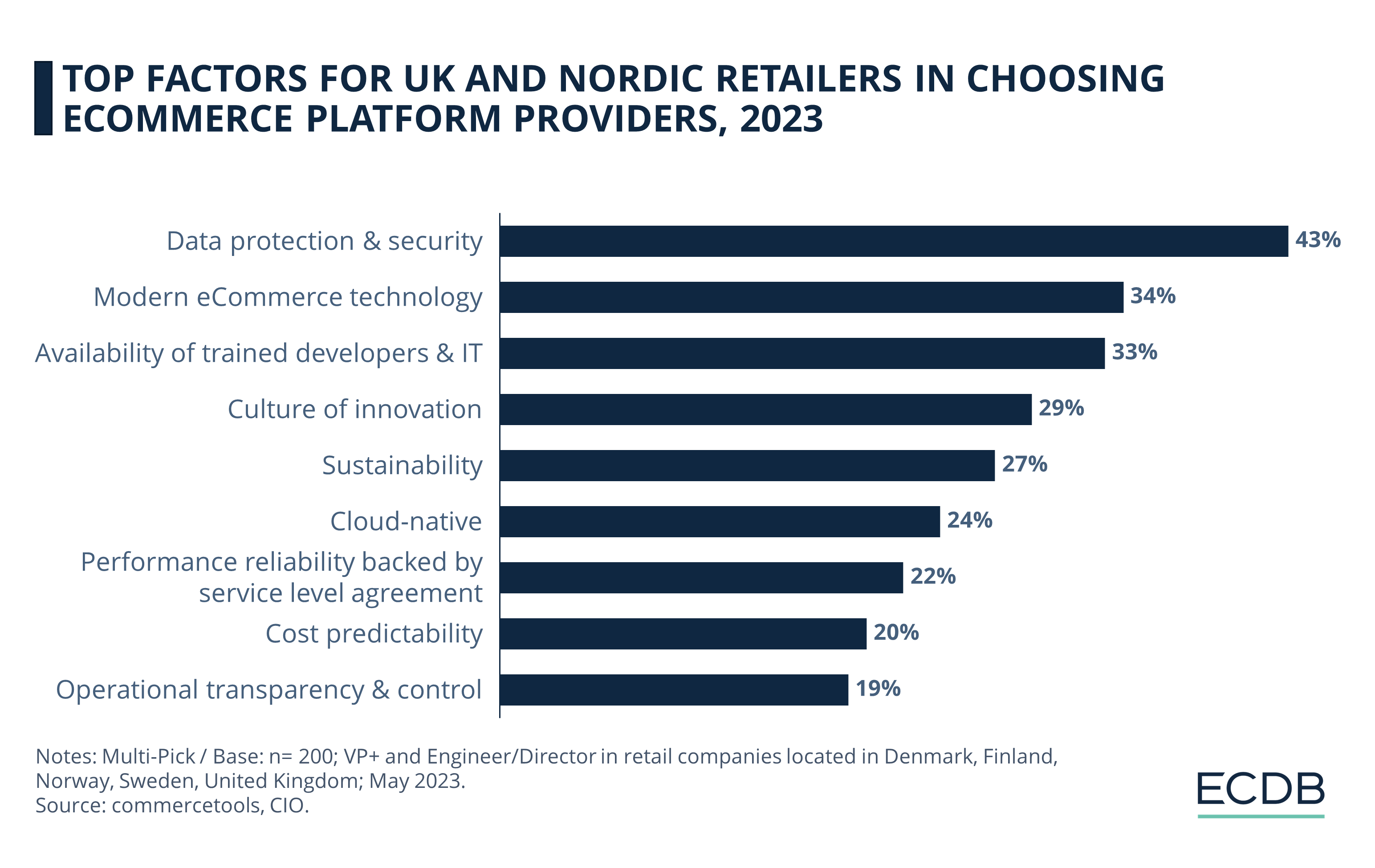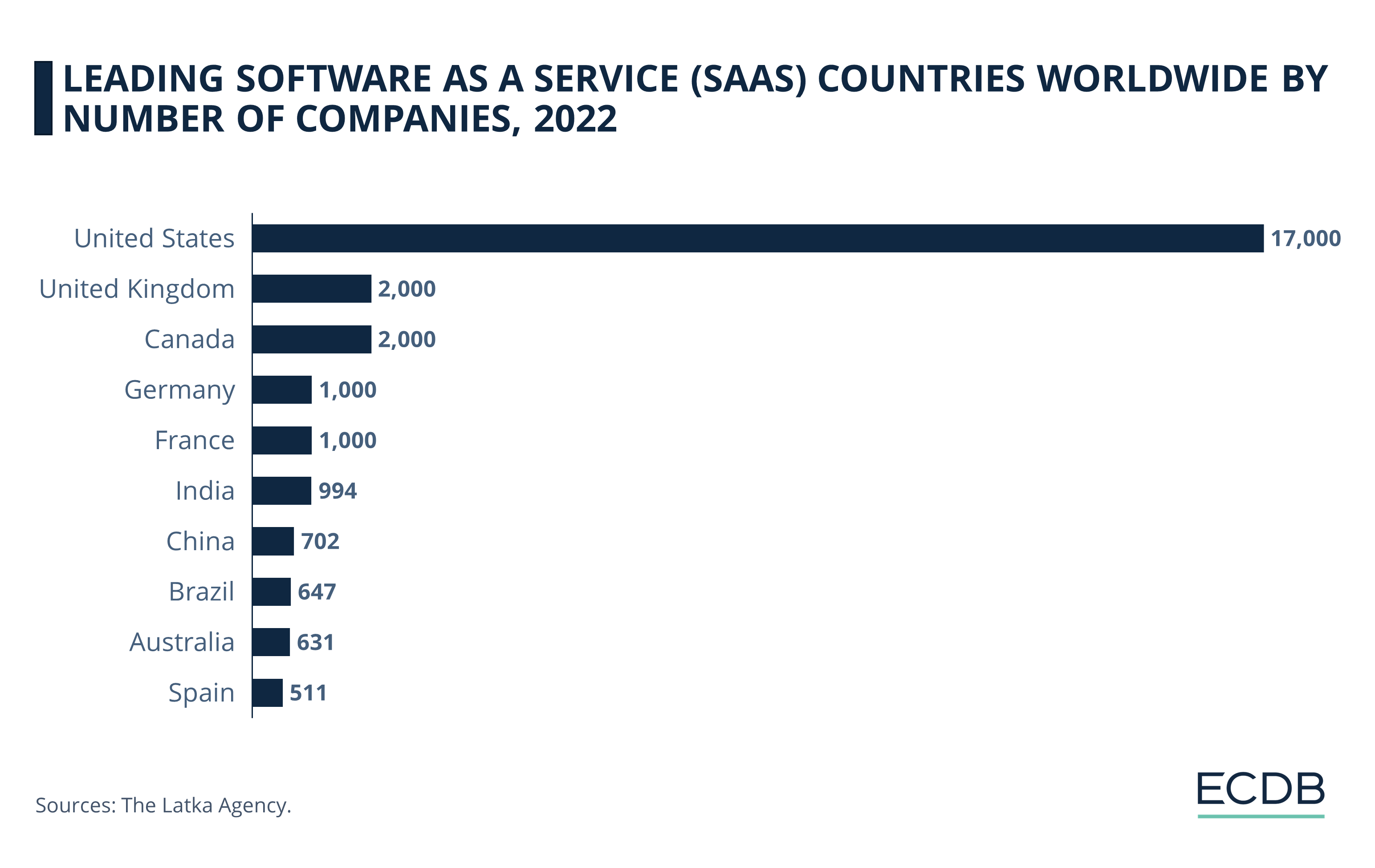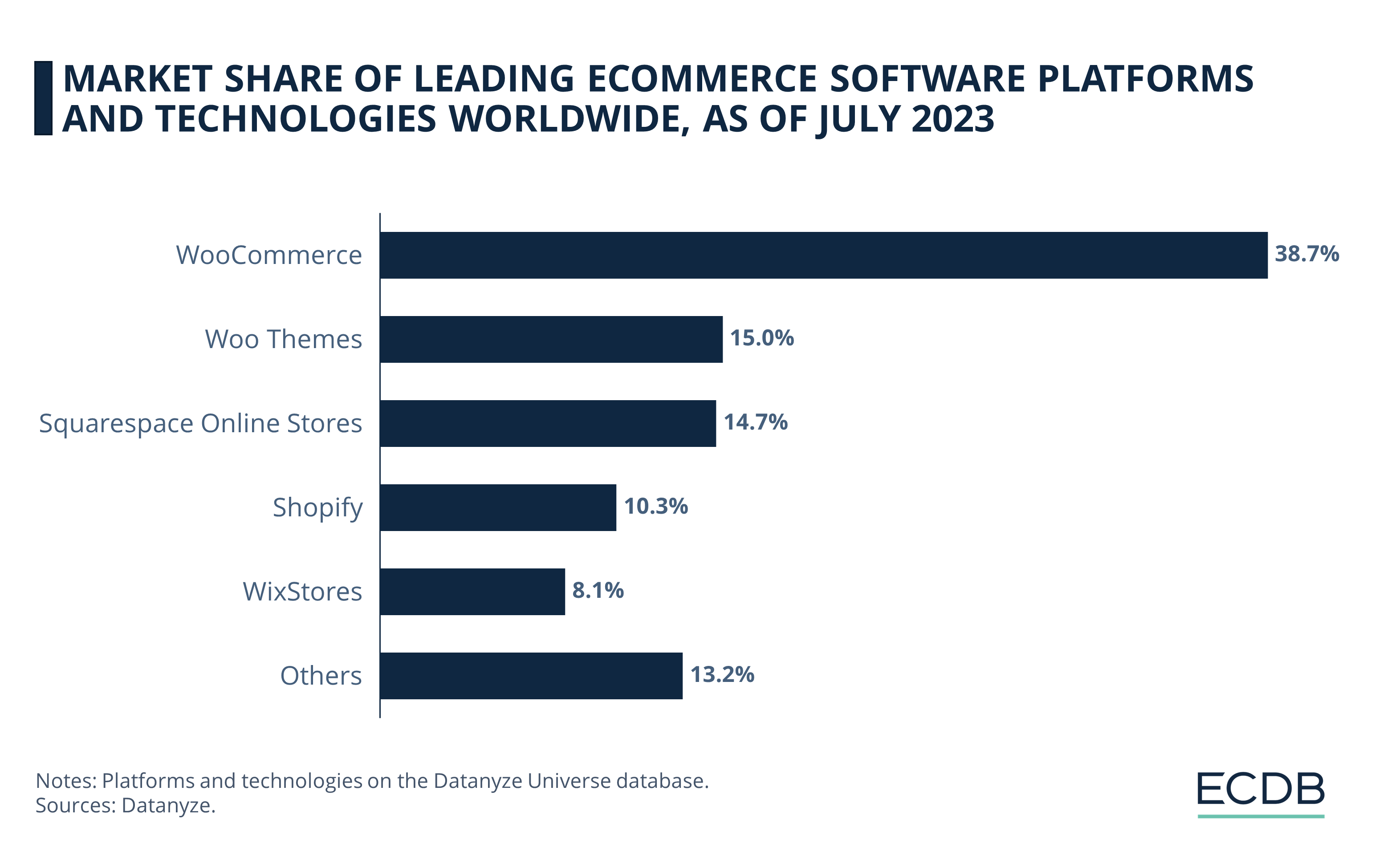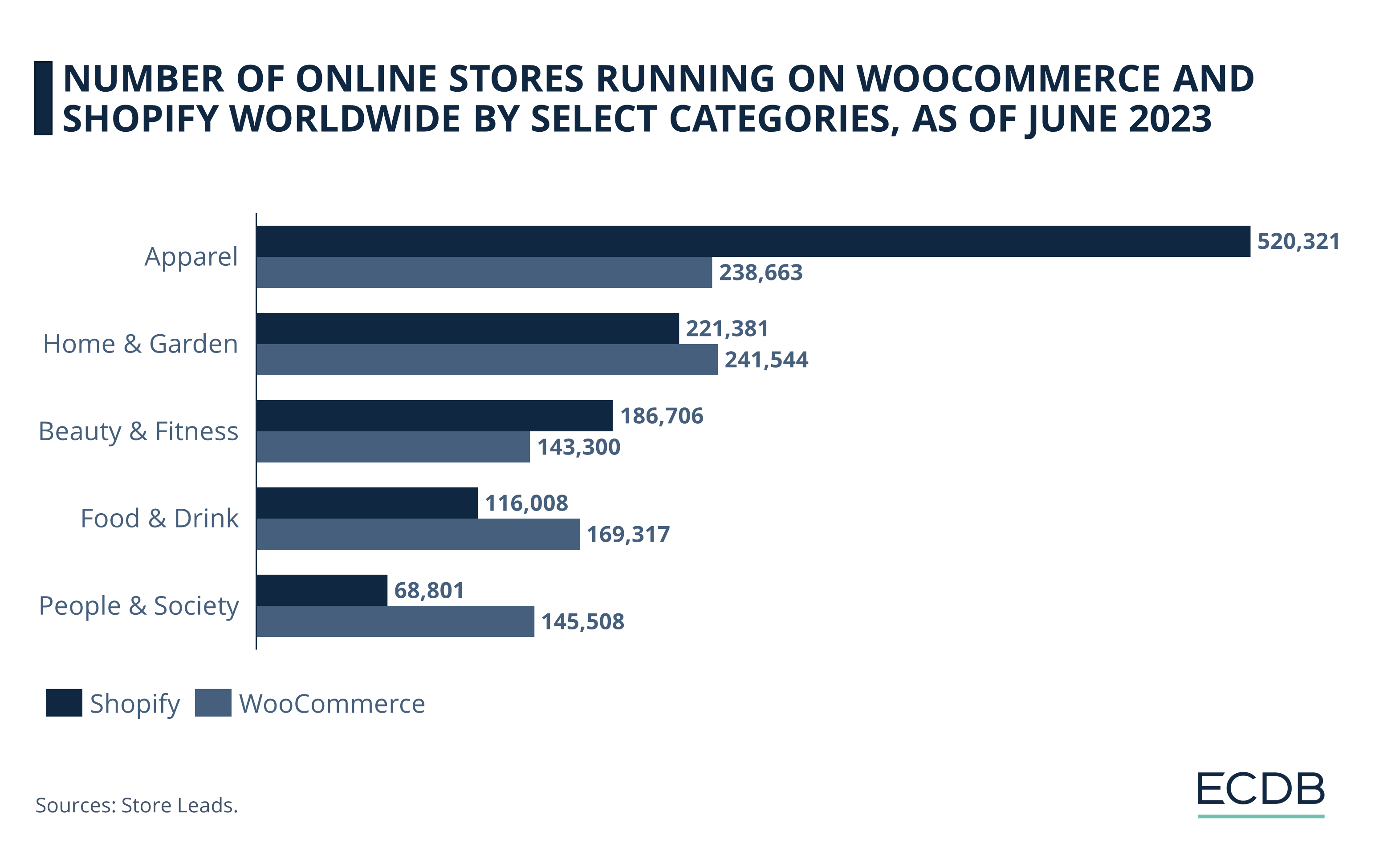eCommerce: Shop Software
Software as a Service (SaaS) in eCommerce: Markets & Examples
Discover SaaS, cloud-based software on subscription, offering hassle-free access, updates, and scalability for diverse businesses, including cloud gaming. Our insight elaborates on these topics, equipping you with valuable industry knowledge.
Article by Cihan Uzunoglu | December 04, 2023Download
Coming soon
Share

Software as a Service (SaaS) in eCommerce: Key Insights
SaaS offers scalable, flexible, and cost-effective software solutions, aligning with key eCommerce priorities like data protection, modern technology, and operational control.
The SaaS model enjoys global penetration, with significant presence in the United States, United Kingdom, Canada, Germany, and France, serving billions of customers worldwide and indicating the pervasive and growing impact of SaaS across diverse markets.
The global eCommerce platform market exhibits robust competition with WooCommerce leading, followed by Woo Themes, Squarespace Online Stores, Shopify, and WixStores.
Shopify and WooCommerce, major players in the SaaS eCommerce space, exhibit distinct sector strengths: Shopify dominates in Apparel and Beauty & Fitness, while WooCommerce leads in Home & Garden, Food & Drink, and People & Society categories, reflecting the diverse range of offerings and specializations in the industry.
Software as a Service, commonly known as SaaS, refers to a cloud computing delivery model where a software provider hosts applications and makes them available to users over the internet on a subscription basis.
SaaS reinvents the traditional approach to software, where users previously had to handle the purchasing, installation, and management of updates on their own systems. It delivers advanced software over the internet on a subscription basis, managing all underlying infrastructure and updates, enhancing convenient access and operational efficiency.
Its scalability and the elimination of upfront costs make it an accessible solution for diverse businesses. The flexibility of SaaS, due to its remote hosting, allows users to adjust their subscription levels according to their evolving needs, and guarantees that they're always operating with the latest software version.
A practical example of SaaS can be seen in the field of cloud gaming. Here, users can stream high-end games that usually require robust computer hardware directly to their TVs or various display devices - no game purchase necessary. Customers simply subscribe to a monthly service, covering all their gaming needs.
Data Safety Before eCommerce Tech for UK and Nordics Retailers
SaaS has successfully embedded itself across numerous industries, ranging from finance and healthcare to education and manufacturing, owing to its versatile benefits. Turning our shift to the eCommerce sector, it is beneficial to first have a look at retailers’ motivations in employing this service.

According to data from commercetools on factors prioritized by UK and Nordic retailers when choosing eCommerce platform providers, “data protection & security” is deemed crucial by a majority of respondents (43%), underscoring the imperative of safeguarding customer information in the digital commerce landscape.
“Modern eCommerce technology” is a priority for 34% of respondents, pointing to the importance of having cutting-edge, competitive features in their chosen platforms. Meanwhile, 33% value the “availability of trained developers & IT”, indicating the need for professional assistance to maintain and optimize the digital shopping experience, while potentially saving personnel costs by outsourcing.
“Culture of innovation” and “sustainability” are key for 29% and 27% of retailers respectively. Less than a quarter (24%) of retailers prioritize “cloud-native”, while “performance reliability”, “cost predictability”, and “operational transparency & control” round out the list, chosen by 22%, 20%, and 19% of respondents respectively.
U.S. by Far Has the Highest Number of SaaS Companies
The SaaS model's appeal is not limited to a particular region but spans the entire world. This vast expansion of SaaS is evident when we cast our gaze upon the global distribution and scale of SaaS companies, and their remarkable influence in various markets.
As the data from the SaaS database Latka shows, the global landscape of Software as a Service (SaaS) is clearly dominated by the United States, hosting an astounding 17,000 SaaS companies. Added together, these firms serve an enormous customer base of approximately 59 billion worldwide, demonstrating the immense reach and impact of the American SaaS industry. The United Kingdom follows in the second position, being home to 2,000 SaaS companies. Despite having a smaller number of companies compared to the U.S., the UK's SaaS sector also has a significant global footprint, catering to a vast customer base of 3 billion worldwide.

Canada, with its own substantial cohort of around 2,000 SaaS companies, holds a strong position in the global SaaS landscape. The significant presence of SaaS companies in Germany and France, each hosting about 1,000 companies, underscores the industry's vitality in these markets. The presence of SaaS companies in other nations including India, China, Brazil, Australia, and Spain, further demonstrates the widespread and growing influence of the SaaS business model across the globe.
WooCommerce Has the Biggest Share of the eCommerce Software Market
The expansion of the SaaS model within digital commerce sets the stage for competition among eCommerce platforms, each seeking to claim the lion's share of the market. Different eCommerce platforms strive for dominance, each offering unique features and services to claim their share of the market.
As of July 2023, an examination by Datanyze of the global market share of leading eCommerce software platforms and technologies reveals some interesting insights. WooCommerce emerges as the most popular platform, claiming a substantial 38.74% of the market. Following WooCommerce, Woo Themes takes the second position with a 14.95% market share. Squarespace Online Stores closely trails Woo Themes, holding 14.67% of the global eCommerce platform market.

Shopify, one of the widely recognized platforms, accounts for 10.32% of the market share. WixStores, another significant player, holds an 8.09% share of the market. The remaining 13.22% of the market is occupied by various other eCommerce platforms, reflecting the diversity and competitiveness of the global eCommerce technology landscape.
Shopify Excels in Apparel, WooCommerce is Strong with People & Society
The considerable engagement of Shopify and WooCommerce, two of the most prominent players in the SaaS industry, provides a chance to analyze their differences, shedding light on the unique advantages each platform offers to various segments of the eCommerce field. A comparative analysis of the number of online stores operating on Shopify and WooCommerce across selected categories offers valuable insights in this context.

Shopify's strongest category is Apparel. With 520,321 stores compared to WooCommerce's 238,663, Shopify clearly dominates in this area. The Home & Garden category, WooCommerce’s forte, presents a different scenario. WooCommerce rocks 241,544 stores in this category, marginally ahead of Shopify, which has 221,381 Home & Garden stores using its services. For context, as of June 2023, Shopify reported having over two million active online stores globally, while WooCommerce was powering over four million active stores around the globe.
Moving on to Beauty & Fitness, we see that Shopify maintains an edge with 186,706 online outlets compared to the 143,300 hosted on WooCommerce. The Food & Drink segment sees WooCommerce outpacing Shopify once again, hosting 169,317 online stores against Shopify's 116,008. Finally, the People & Society category sees a significant discrepancy, with WooCommerce having 145,508 online stores, more than double the 68,801 running on Shopify.
Sources: commercetools, Latka, Datanyze, Store Leads, Statista, ECDB

Click here for
more relevant insights from
our partner Mastercard.
Related insights
Deep Dive
The Customer Journey in Online Shopping: It Begins with Search Engines
The Customer Journey in Online Shopping: It Begins with Search Engines
Deep Dive
Fast Fashion Online Market: Fast Fashion Is Not Fair Fashion
Fast Fashion Online Market: Fast Fashion Is Not Fair Fashion
Deep Dive
Otto: Can the German Retail Company Maintain Relevance and Drive Revenue in eCommerce?
Otto: Can the German Retail Company Maintain Relevance and Drive Revenue in eCommerce?
Deep Dive
What Exactly Are In-Game or In-App Purchases?
What Exactly Are In-Game or In-App Purchases?
Deep Dive
AI in eCommerce: Better Deals, Greater Precision, and Easier Targeting
AI in eCommerce: Better Deals, Greater Precision, and Easier Targeting
Back to main topics